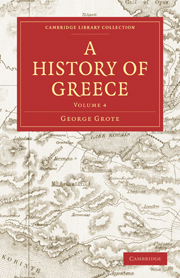Book contents
- Frontmatter
- Contents
- PART II CONTINUATION OF HISTORICAL GREECE
- CHAPTER XXV Illyrians, Macedonians, Pæonians
- CHAPTER XXVI Thracians and Greek Colonies in Thrace
- CHAPTER XXVII Kyrênê.—Barka.—Hesperides
- CHAPTER XXVIII Pan-Hellenic Festivals—Olympic, Pythian, Nemean and Isthmian
- CHAPTER XXIX Lyric Poetry.—The Seven Wise Men
- CHAPTER XXX Grecian Affairs during the Government of Peisistratus and his Sons at Athens
- CHAPTER XXXI Grecian Affairs after the Expulsion of the Peisistratids.—Revolution of Kleisthenês and Establishment of Democracy at Athens
- CHAPTER XXXII Rise of the Persian empire.—Cyrus
- CHAPTER XXXIII Growth of the Persian Empire
- CHAPTER XXXIV Dêmokêdês.—Darius invades Scythia
- CHAPTER XXXV Ionic Revolt
- CHAPTER XXXVI From Ionic Revolt to Battle of Marathon
- CHAPTER XXXVII Ionic Philosophers.—Pythagoras.—Kroton and Sybaris
- Titles in the Series
CHAPTER XXVIII - Pan-Hellenic Festivals—Olympic, Pythian, Nemean and Isthmian
Published online by Cambridge University Press: 29 August 2010
- Frontmatter
- Contents
- PART II CONTINUATION OF HISTORICAL GREECE
- CHAPTER XXV Illyrians, Macedonians, Pæonians
- CHAPTER XXVI Thracians and Greek Colonies in Thrace
- CHAPTER XXVII Kyrênê.—Barka.—Hesperides
- CHAPTER XXVIII Pan-Hellenic Festivals—Olympic, Pythian, Nemean and Isthmian
- CHAPTER XXIX Lyric Poetry.—The Seven Wise Men
- CHAPTER XXX Grecian Affairs during the Government of Peisistratus and his Sons at Athens
- CHAPTER XXXI Grecian Affairs after the Expulsion of the Peisistratids.—Revolution of Kleisthenês and Establishment of Democracy at Athens
- CHAPTER XXXII Rise of the Persian empire.—Cyrus
- CHAPTER XXXIII Growth of the Persian Empire
- CHAPTER XXXIV Dêmokêdês.—Darius invades Scythia
- CHAPTER XXXV Ionic Revolt
- CHAPTER XXXVI From Ionic Revolt to Battle of Marathon
- CHAPTER XXXVII Ionic Philosophers.—Pythagoras.—Kroton and Sybaris
- Titles in the Series
Summary
In the preceding chapters I have been under the necessity of presenting to the reader a picture altogether incoherent and destitute of central effect—to specify briefly each of the two or three hundred towns which agreed in bearing the Hellenic name, and to recount its birth and early life, as far as our evidence goes—but without being able to point out any action and reaction, exploits or sufferings, prosperity or misfortune, glory or disgrace, common to all. To a great degree, this is a characteristic inseparable from the history of Greece from its beginning to its end, for the only political unity which it ever receives is the melancholy unity of subjection under all-conquering Rome. Nothing short of force will efface in the mind of a free Greek the idea of his city as an autonomous and separate organization: the village is a fraction, but the city is an unit,—and the highest of all political units, not admitting of being consolidated with others into a ten or a hundred, to the sacrifice of its own separate and individual mark. Such is the character of the race, both in their primitive country and in their colonial settlements—in their early as well as in their late history—splitting by natural fracture into a multitude of self-administering, indivisible, cities.
- Type
- Chapter
- Information
- A History of Greece , pp. 68 - 98Publisher: Cambridge University PressPrint publication year: 2010First published in: 1847

